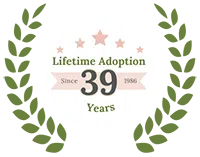Adoption Laws in Florida Explained: A Simple Guide for Families

It is important to always consult an experienced adoption attorney or a licensed child-placing adoption agency like Lifetime Adoption if you have questions about Florida adoption. This guide provides a clear and easy-to-understand overview of adoption laws in Florida to help prospective adoptive parents, expectant parents, and others navigate the process with confidence.
Table of Contents
- Who is Eligible to Adopt Under Florida Adoption Laws?
- Who is Eligible to be Adopted Under Florida Law?
- What Are Florida’s Adoption Consent Laws?
- Termination of Parental Rights Under Florida Adoption Laws
- Types of Adoption in Florida
- Adoption Costs in Florida
- Post-Adoption Communication in Florida
- Accessing Florida Adoption Records
- Common Questions About Adoption Laws in Florida
Who is Eligible to Adopt Under Florida Adoption Laws?
Adoption laws in Florida clearly outline who is eligible to adopt. According to Florida Statutes Section 63.042, the following individuals or couples may adopt:
- Any unmarried adult.
- A married couple jointly.
- A married individual, if their spouse cannot be part of the adoption due to incapacity or if they are legally separated.
Adoption in Florida is open to individuals and couples who meet the legal requirements. At Lifetime Adoption, a Florida-licensed adoption agency, we are dedicated to helping families provide a loving and supportive home for a child. Florida law ensures that all eligible families have the opportunity to adopt and grow their families through this life-changing process.
Who is Eligible to be Adopted Under Florida Law?
Under Florida law, the following individuals may be adopted:
- Minors:
The vast majority of adoptions involve children under the age of 18. Birth parents must consent to the adoption unless their parental rights have been terminated. - Adults:
Adult adoption is allowed in Florida, often to formalize a parent-child relationship that existed informally during the adoptee’s childhood. This can also be used in cases where adult stepchildren or foster children wish to be legally adopted by a stepparent or guardian.
What Are Florida’s Adoption Consent Laws?
In Florida, a birth mother can sign her consent to adoption no sooner than 48 hours after the birth of the child or upon being discharged from the hospital, whichever occurs first. Obtaining consent is one of the most critical aspects of the adoption process. According to Florida Statutes Section 63.062, consent must be provided by:
Obtaining consent is one of the most critical aspects of the adoption process. According to Florida Statutes Section 63.062, consent must be provided by:
- The child’s birth mother.
- The child’s birth father, if:
- He was married to the mother when the child was conceived or born.
- His name appears on the child’s birth certificate.
- He has filed an affidavit of paternity.
- He has adopted the child.
- Any legal guardian or custodian of the child.
- The child, if they are 12 years of age or older (the court may waive this requirement in certain circumstances).
Consent needs to be provided in writing and witnessed by two individuals who are at least 18 years old. Once given, consent is irrevocable except in cases of fraud or duress.
Termination of Parental Rights Under Florida Adoption Laws
For an adoption to proceed, the biological parents’ legal rights must be terminated. This process ensures that the adoptive parents can assume full legal responsibility for the child. Parental rights can be terminated voluntarily, through the consent process, or involuntarily, if the court determines that the biological parents are unfit.
Florida’s Home Study Requirements
A home study is an important and required step in the adoption process in Florida. This assessment ensures that the prospective adoptive family can provide a safe, loving, and stable home for the child. The requirements for a home study are outlined in Florida Statutes Section 63.092 and include:
- Background checks for all adults living in the home.
- Personal interviews with family members.
- Verification of financial stability.
- Inspection of the physical home environment.
- References from non-family members.
In some cases, the court may waive the home study requirement, such as when a stepparent or close relative is adopting the child.
Types of Adoption in Florida
Florida recognizes several types of adoption, each with its unique procedures and requirements:
1. Agency Adoption in Florida
In this type of adoption, a licensed adoption agency coordinates the placement of a child with an adoptive family. Agencies ensure compliance with state laws, conduct home studies, and provide support services to both birth and adoptive parents. Lifetime Adoption is proud to be a trusted Florida-licensed adoption agency. With over three decades of experience, we are here to offer compassionate and professional guidance, ensuring every step of the adoption process is as smooth and supported as possible.
2. Private Adoption
Also known as independent adoption, this process allows adoptive parents and birth parents to work directly with each other, often with the assistance of an adoption attorney. Florida law requires that a licensed professional or attorney oversee certain aspects of private adoptions to ensure the process adheres to state regulations.
3. Stepparent Adoption
Stepparent adoption occurs when a stepparent seeks to adopt their spouse’s biological child. This process is often simpler than other types of adoption, as long as the noncustodial parent consents or their parental rights have been terminated.
4. Relative or Kinship Adoption
Florida law prioritizes placing children with relatives when possible. Grandparents, aunts, uncles, and other close family members may adopt children who cannot remain with their biological parents.
5. Adult Adoption
Adult adoption formalizes a parent-child relationship when the adoptee is over 18. This process typically requires only the consent of the adoptive parent and the adult adoptee.
Adoption Costs in Florida
Adoption costs in Florida vary depending on the type of adoption. According to Florida Statutes Section 63.097, adoptive parents may be responsible for:
- Court and legal fees.
- Adoption agency fees.
- Pregnancy-related expenses, including medical care, counseling, and reasonable living expenses during pregnancy and recovery.
State laws strictly regulate allowable expenses to prevent unethical practices and financial exploitation.
Post-Adoption Communication in Florida
Florida allows open adoptions, where birth parents and adoptive parents agree to maintain some level of contact after the adoption is finalized. This arrangement is not legally enforceable unless it is included in a court-approved post-adoption communication agreement under Florida Statutes Section 63.0427.
Finalizing the Adoption in Florida
Once all legal requirements have been met, the adoption is finalized in a court hearing. During this hearing, the judge reviews the case and ensures that the adoption is in the child’s best interests. Once approved, the adoptive parents receive a final judgment of adoption, and the child’s birth certificate is updated to reflect the new parent-child relationship.
Interstate Adoptions and ICPC
If the child being adopted is from another state, the adoption must comply with the Interstate Compact on the Placement of Children (ICPC). This ensures that both Florida’s laws and the laws of the child’s home state are followed.
Accessing Florida Adoption Records
Florida keeps adoption records confidential. According to Florida Statutes Section 63.162, adoption records are sealed and can only be accessed by court order. However, adult adoptees and birth parents may register with the Florida Adoption Reunion Registry (FARR) to facilitate voluntary contact.
Common Questions About Adoption Laws in Florida
Can a birth parent start an adoption from the hospital, during, or after delivery?
Yes, a birth parent can begin the adoption process at any time, whether they are still in the hospital, during labor, or after delivery. Lifetime Adoption is available 24/7 to support birth parents during these critical moments, providing guidance and ensuring they feel empowered in their decisions.
What are the requirements for adopting a child in Florida?
Prospective adoptive parents must meet eligibility criteria outlined in Florida Statutes Section 63.042, including completing a home study and obtaining consent.
Can birth parents change their mind after giving consent?
Consent to adoption in Florida is irrevocable except in cases of fraud or duress.
How much does adoption cost in Florida?
Costs vary by adoption type but include court fees, agency fees, and permissible birth parent expenses.
Still Have Questions About Florida Adoption Laws?
Understanding adoption laws in Florida is key to navigating the process successfully. Whether you’re a prospective adoptive parent or a birth parent considering adoption, being informed about the legal framework will help you make confident decisions. This guide is informational in nature and should not constitute legal advice. Questions about Florida adoption law should always be directed to an experienced attorney. Consulting with a licensed adoption professional like Lifetime Adoption can also provide personalized guidance tailored to your unique circumstances. Call or text us anytime – we’re happy to help!

Lifetime Adoption, Inc. is a Licensed Child Placing Agency in Arkansas. (License AR #00050809)
Copyright © | Lifetime Adoption





